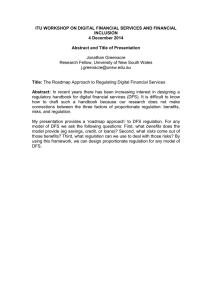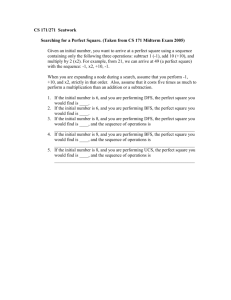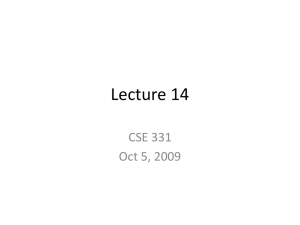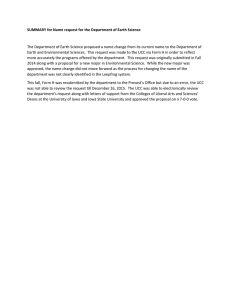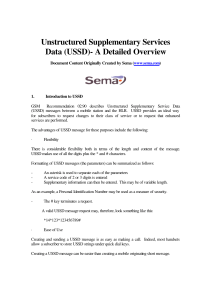DFS Competition Concerns in Sub Saharan Markets Abdul Musoke Uganda Communications Commission
advertisement
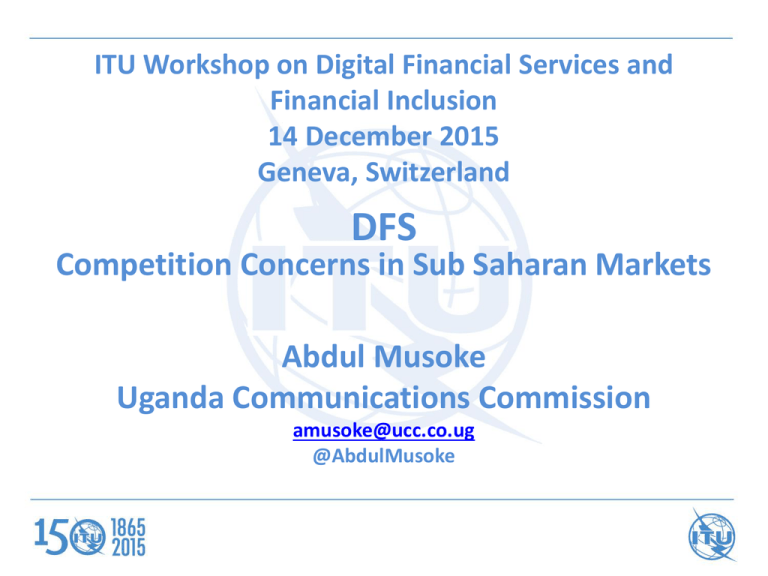
ITU Workshop on Digital Financial Services and Financial Inclusion 14 December 2015 Geneva, Switzerland DFS Competition Concerns in Sub Saharan Markets Abdul Musoke Uganda Communications Commission amusoke@ucc.co.ug @AbdulMusoke The DFS Market Place • DFS in Uganda and other SubSaharan markets predominantly MFS services. • Highly dependent on SMS and USSD • As such control of SMS and USSD services is a key competitive advantage for any actor in the Sub Saharan DFS market place • Competitive leverage is also derived from control of distribution channels and the ability to offer bundled remittance and voice services MNO is king Source - Quotesgram • The control of vertical inputs, distribution channels and the ability to provide bundled services have positioned the MNOs as kings in the DFS value chain • Limited leverage by Aggregators and stand alones MFS • Sadly, this may sometimes abused at both the wholesale and retail segments of the Mobile Money market • Also worth noting is limited regulatory clarity due to the cross sectoral nature of MFS Wholesale DFS Concerns Summary of Issues Impact Dominance in Provisioning of USSD and SMS Vertical Integration by MNOs • Limited growth of stand alone deployments. Limited Countervailing Power Access Seekers and Integrators • In Uganda, Ezee Money remains the only standalone MM service albeit with a market share of less than 5% of total MM transactions Bundling Effects • Bank led mobile money deployments yet to take off like the telco led deployments. Lack of Transparency in Trade agreements, Banks & Payment Integrators Limited Cost Transparency Possibility of Differentiated Service Quality • Very limited growth of MM payment integrators Retail Competition Concerns in Mobile Money Markets Summary of Issues Impact Agent Exclusion Non FRAND Terms in Merchant Agreements High Off net Transfer Fees Cross Subsidies Privileged or Exclusive access to the MM sales and distribution channel Reinforcing first mover advantage some times excluding the entry of non integrated MNOs MNOs entering markets with developed MM deployments must enter at the same scale as the incumbents if the are to credibly compete with the incumbents Common Forms of Anti Competitive Practices in MM market 1) Refusal or delays in Supply of USSD and SMS services 2) Excessive wholesale prices for USSD and SMS 3) Misuse of third party trade information 4) Excessive inter-wallet P2P transfer fees 5) Cross subsidization of MFS and Telco service Why Competition in DFS should matter Allow for entry of new players especially standalone MM and bank led deployments and hopefully retail price reductions Limit spill over effects in regulated telecom services Why should competition in DFS matter ? Increase Service Variety Regulatory Response • • • • • • Extending Telco Regulator Mandate to cover VAS services (in the UCC Act 2013 – Contested in Court) Acknowledgment of need for Central Bank – NRA coregulation Lack of a collaborative framework across sectors in parent laws (Communications Act & FI Act) Establishment of Standing MFS regulatory committee Issuance of the Mobile Money (MM) guidelines 2013 by the Bank of Uganda Mobile Money Guidelines among other functions provide guidance on the matter of anti competitive actions in the provision of Mobile Money Services as well as the role of the NRA in MM Regulatory Response • The pursuit of anti competitive practices like alleged fore closing prices & practices in the USSD/SMS submarket demands that the NRA proves; Dominance of the alleged abusive entity as well as undertake costing of services in cases of exclusionary and excessive pricing abuses. • To date there has been limited costing of key production inputs in the MFS ecosystem. • However, UCC has also concluded a Telecom Market Definition and the provision of whole USSD and SMS has been identified as a “Market”. • This may be the foundation for explicit regulatory obligations for MNOs derived from the control of key factor inputs in the MM space. Current Considerations Abuse Classification Regulatory Obligation Denial/delay in supply of essential USSD and SMS services Vertical Foreclosure and or Denial of Service Service Provisioning timelines for third party access seekers Discriminatory terms across merchants Service Discrimination Reference USSD/SMS Access Agreements QoS Differentiation btn own MM and third party MM service Exclusionary practice Standard QoS Obligations for USSD services Cross subsidization Exclusionary Practice Account Separation and Price – Cost Orientation Excessive Cross Wallet Transfer Fees Cost Accounting Obligations Price – Cost Orientation Anti Trust Precedents - Commercial Courts - In Ezee Money U Ltd Vs MTN U Ltd, Ezee Money a standalone payments and remittance provider among others raised the following issues; - Abuse of MTN’s dominant position in the provision of key communication’s services owed to Ezee Money under the UCC Act 2013 - Legality of exclusive agent dealings In his ruling of 6 November 2015, the presiding judge ruled that; - the defendant’s denial of key communication services to the plaintiff was contrary to its obligations under section 53 of the Communications Act while exclusive agent dealings were contrary to the Communications Fair Competition Regulations - General damages and punitive damages of approximately USD 500,000 were awarded to the Plaintiff - - Exclusive agent agreements were declared null and Void Abdul Musoke Nyenje Tariff & Interconnect - UCC amusoke@ucc.co.ug, abdulmusoke@gmail.com Tel: +256-414-339058 Mob:+256-712-699209 @AbdulMusoke

